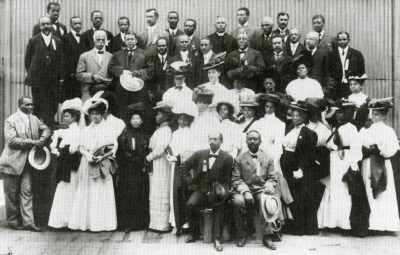Last night I attended the first meeting of Dr. Leslie B. McLemore's JSU Reading Community last night (09/29) at the Cyber Cafe in JSU's H.T. Sampson Library. SANKOFA Reading Group members and guests also attended. Nettie Stowers and Janice Dickens Jackson were among the 10 winners of paperback copies of The Mis-Education of the Negro by Carter G. Woodson. The Mis-Education of the Negro is the next selection of the JSU Reading Community.
Dr. McLemore led the discussion of The Souls of Black, while students, professors and community members offered their input. The most interesting discussion centered on the 3rd essay in The Souls of Black Folk. The 3rd essay focuses on Du Bois' criticism of Booker T. Washington. Discussion leaders took sides, proudly declaring themselves to be either Du Bois supporters or Washington supporters. But personally I and several other members of the audience argue that it does not have to be an either/or choice. Both men introduced ideas that if we as a people can synthesize would make us a stronger community. Listen to what both men have to say and then decide.
Du Bois: Talented Tenth
I would not deny, or for a moment seem to deny, the paramount necessity of teaching the Negro to work, and to work steadily and skillfully; or seem to depreciate in the slightest degree the important part industrial schools must play in the accomplishment of these ends, but I do say, and insist upon it, that it is industrialism drunk with its vision of success, to imagine that its own work can be accomplished without providing for the training of broadly cultured men and women to teach its own teachers, and to teach the teachers of the public schools. . . .
I am an earnest advocate of manual training and trade teaching for black boys, and for white boys, too. I believe that next to the founding of Negro colleges the most valuable addition to Negro education since the war, has been industrial training for black boys. Nevertheless, I insist that the object of all true education is not to make men carpenters, it is to make carpenters men; there are two means of making the carpenter a man, each equally important: the first is to give the group and community in which he works, liberally trained teachers and leaders to teach him and his family what life means; the second is to give him sufficient intelligence and technical skill to make him an efficient workman; the first object demands the Negro college and college-bred men not a quantity of such colleges, but a few of excellent quality; not too many college-bred men, but enough to leaven the lump, to inspire the masses, to raise the Talented Tenth to leadership; the second object demands a good system of common schools, well-taught, conveniently located and properly equipped.
Source:
http://teachingamericanhistory.org/library/index.asp?document=174
Booker T. Washington: Industrial Education is the Solution
I would not confine the race to industrial life, not even to agriculture, for example, although I believe that by far the greater part of the Negro race is best off in the country districts and must and should continue to live there, but I would teach the race that in industry the foundation must be laid that the very best service which any one can render to what is called the higher education is to teach the present generation to provide a material or industrial foundation. On such a foundation as this will grow habits of thrift, a love of work, economy, ownership of property, bank accounts. Out of it in the future will grow practical education, professional education, positions of public responsibility. Out of it will grow moral and religious strength. Out of it will grow wealth from which alone can come leisure and the opportunity for the enjoyment of literature and the fine arts.
Source:
http://teachingamericanhistory.org/library/index.asp?document=62





